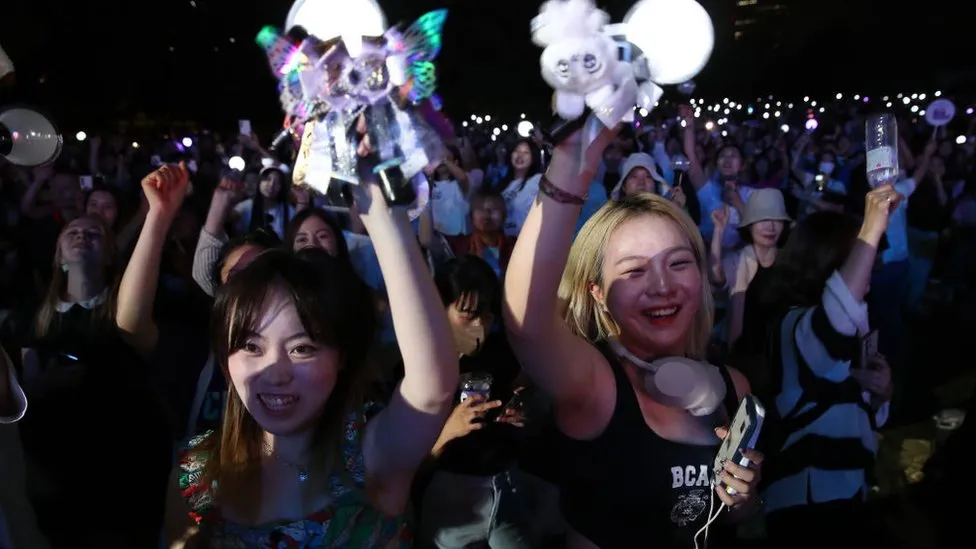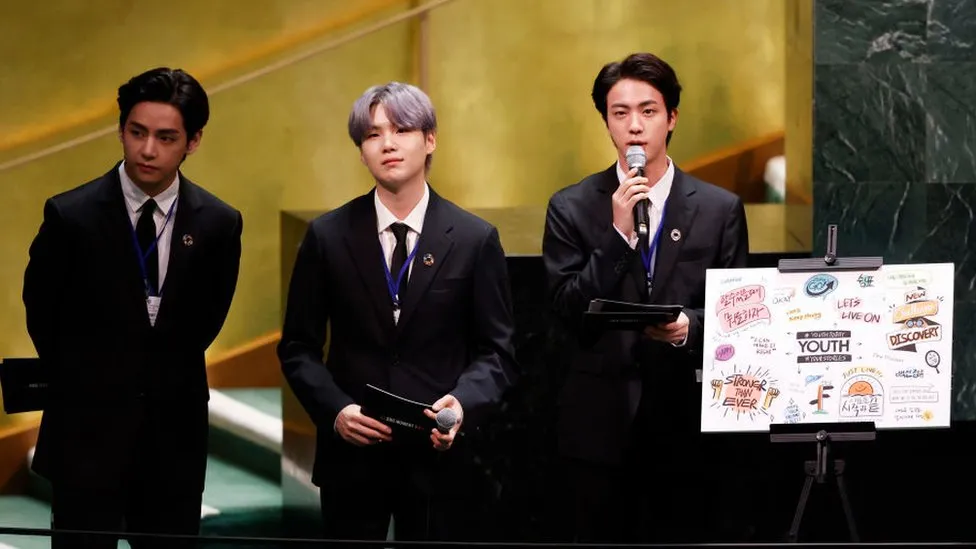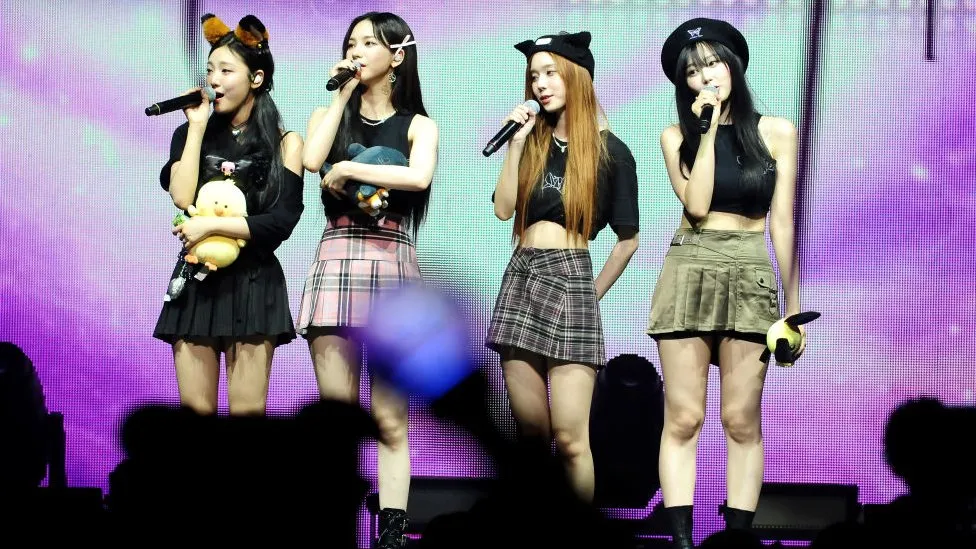K-pop: How jealous 'super fans' try to dictate their idols' private lives
When K-pop star Karina posted a handwritten apology on Instagram earlier in March, it was both contrite and profuse.
“I sincerely apologise for surprising my fans who have supported me,” the frontwoman of the girl group aespa wrote.
Her offence?
Publicly acknowledging that she was in a relationship with actor Lee Jae-wook.
That Karina felt compelled to say sorry for being in a relationship has puzzled many outside the K-pop scene, but it opens a window into the world of the industry’s “super fans”.
They stream their favourite stars’ music round the clock – even if on mute while sleeping – to boost chart rankings, organise mass voting sessions during award seasons, and sometimes even sponsor digital billboard ads in places like Times Square, New York.
Paying the price of love
When news of Karina’s relationship broke, some fans drove a truck to her management agency.
“We supported Karina’s bright future, believing in a shared dream, but it was our misconception,” blared an electronic billboard on the vehicle.
“Is the love given to you by your fans not enough?” another read.
This stands in contrast to how celebrities’ romantic lives are often publicised, and sometimes celebrated, in other parts of the world.
Take Taylor Swift, for example, whose attendance at last month’s Super Bowl to watch her boyfriend Travis Kelce is said to have singlehandedly boosted TV viewership of the game, making it the most-watched broadcast in the US since the 1969 Moon landing.
Polls say one in five Super Bowl viewers were rooting for the Kansas City Chiefs – which eventually won the annual league – because of the pop star’s relationship with Kelce.
So why are the attitudes different in K-pop?
‘A false intimacy’
“The fans feel jilted,” said Korean media columnist Jeong Deok-hyeon, adding that K-pop fans often view themselves as being in parasocial relationships with the idols.
These refer to one-sided relationships where one party expends an overt amount of time, emotional energy and money on another whom they are fascinated with, but who may not know they exist.
“As the industry increasingly encourages fans to express their fandom through consumerism, their desire to be ‘compensated’ [for their investments] grows. This contributed to fans making demands which sometimes border on threats,” Mr Jeong told the BBC.
Some believe the artistes themselves and their management agencies have facilitated a “false intimacy” between idols and fans.
Even as recently as 10 years ago, it was common practice for K-pop agencies to ban new stars from dating or even have a personal mobile phone.
Agencies have also begun creating social apps for their artists which appear to offer fans a glimpse of their idols’ everyday lives. SM, the K-pop-producing powerhouse behind groups like aespa, introduced an app in 2020 designed to look like a one-on-one messenger app, but is in fact a group chat where the idol drops messages for thousands of fans at once.
Some stars have also bought gifts for fans or offered them one-on-one calls.
“K-pop agencies have been telling fans that they have the power to create stars,” said Areum Jeong, an Assistant Professor of Korean Studies at Arizona State University.
Cedarbough Saeji from Pusan National University called the Karina incident “a classic case of the fans trying to ‘discipline’ the stars”.
“They were angry about the dating, and then they got angry that she apologised in the ‘wrong way’,” said Saeji, an assistant professor in Korean and East Asian Studies, referring to how some fans felt Karina should have posted her apology in a fans-only forum – rather than on a public platform.
“In 2024, privacy for K-pop stars, who live in this tiny country and are so widely recognized, is virtually impossible,” she said.
Ms Jeong, who considers herself a dedicated K-pop fan, also takes part in “fan labour” by streaming the music of her favourite boyband NCT 127 and paying to vote for them on music platforms and award shows.
There are a dozen different digital music platforms for K-pop, each with its own Top 100 chart based on the number of people streaming and downloading songs. Super fans divide and conquer by organising themselves into teams to navigate the rules for each platform.
“Fans put in labour to ensure the group’s success. They consider the idol a product. And if you want to see the product on the stage for a long time, the artistes, the fans, and the management will all have to put in hard work,” Ms Jeong said.
Some even share voting schedules and streaming guides with “regular fans”, she added, so they can contribute to propelling their idols to the top of the charts.
The BBC browsed a “streaming guide” written up by fans of the boyband Seventeen, which includes reminders such as, “Watch two or three other Seventeen music videos that totals to at least seven to 10 minutes. Then repeat the process”, and “Do not pause, forward or rewind”.
Large fan groups organise themselves so that different members take on different roles.
ARMY, the millions-strong fan group for the world’s biggest boyband BTS, has taken on philanthropic projects on behalf of the band, and also operate X accounts that translate all BTS-related content, from song lyrics to members’ social media posts.

“The superfans fundraise, they campaign to vote… Some police comments online to make sure negative comments about their idols are reported and conduct coordinated searches to remove ‘bad’ search terms.
“That’s all money and time. The industry profits off of it,” Ms Jeong said.
Another hallmark of K-pop fandom are the birthday celebrations held for the idols who themselves are not present. Some fans rent out entire cafes for such events, which will also feature merchandise related to the idol.
Changing attitudes
K-pop columnist Jeff Benjamin said some idols may feel “obliged to keep their fans happy” because of the fragility of their careers.
“The groups are typically quite short-lived at about four to five years… I think a big part of why Karina published her apology was because she has a leadership responsibility in aespa, and she wanted to assure her fans that she will continue to work hard with her music,” he said.
“It’s ironic that these artists sing about love but dating is frowned upon. I feel for them,” he added.
But as K-pop widens its global footprint, attitudes in the industry could be opening up too.

Many of Karina’s international fans took to social media to express their outrage that she had been compelled to apologise.
“She doesn’t deserve this type of treatment” read one comment on X (formerly Twitter), while another said “Karina apologising for LIKING someone has to be one the craziest things in the world”.
Some Korean fans also pointed to the international coverage of her apology, saying it was embarrassing. “It’s been so long since K-pop became global but they still don’t seem to grasp the fact that when something like this happens, it immediately disgraces the country” one person wrote.
The global K-pop events market was valued at $8.1bn in 2021 and is projected to reach $20bn by 2031, according to Allied Market Research.
Groups have also been invited to perform at international events. Seventeen, for example, will become the first K-pop group to perform at the Glastonbury Festival this year. BTS, who have been named special envoys by the UN, was invited to perform at its New York headquarters in 2021.
K-pop albums raked in a record $243.8m overseas from January to October last year. Japan, the United States and China were the top three buyers.
“Things are changing as the number of international K-pop fans grows. I am hopeful that the fan bases will become more supportive and open-minded… And that the industry can be less dependent on traditional norms,” Mr Benjamin said.
Some of Karina’s fans in South Korea have continued to vouch for her.
“There was nothing to apologise for…Whether you are a celebrity or a regular person, you need close friends. It’s natural for her to have a lover,” said Jeong So-yeon, a 33-year-old fan based in Seoul.
“Other top stars do fine even after dating ‘scandals’. I look forward to her next albums,” she said.
Surely this is the world?
Solo Performance -Butterfly Effect- Saturday, July 1, 2023 @GRIT at shibuya







